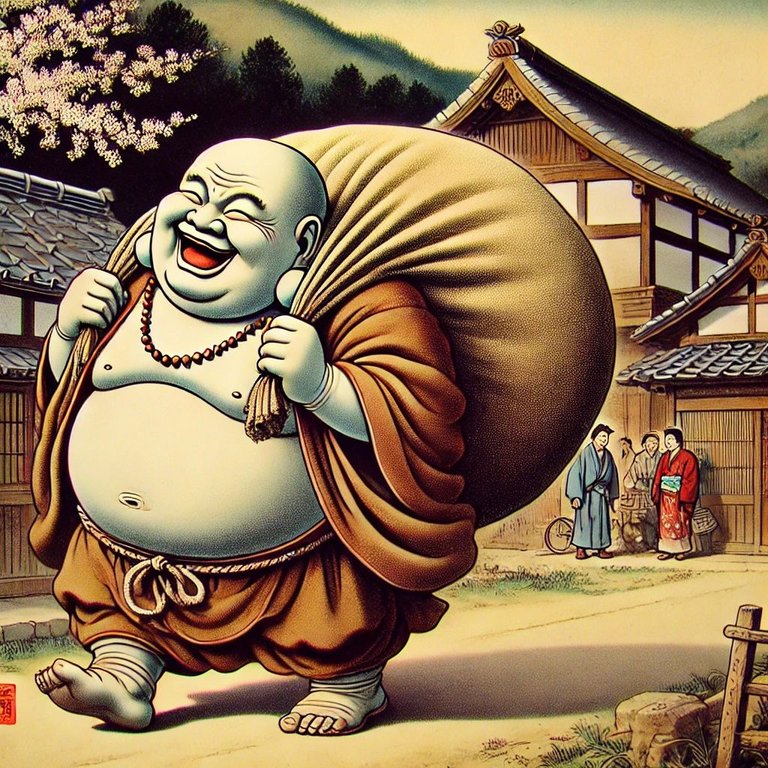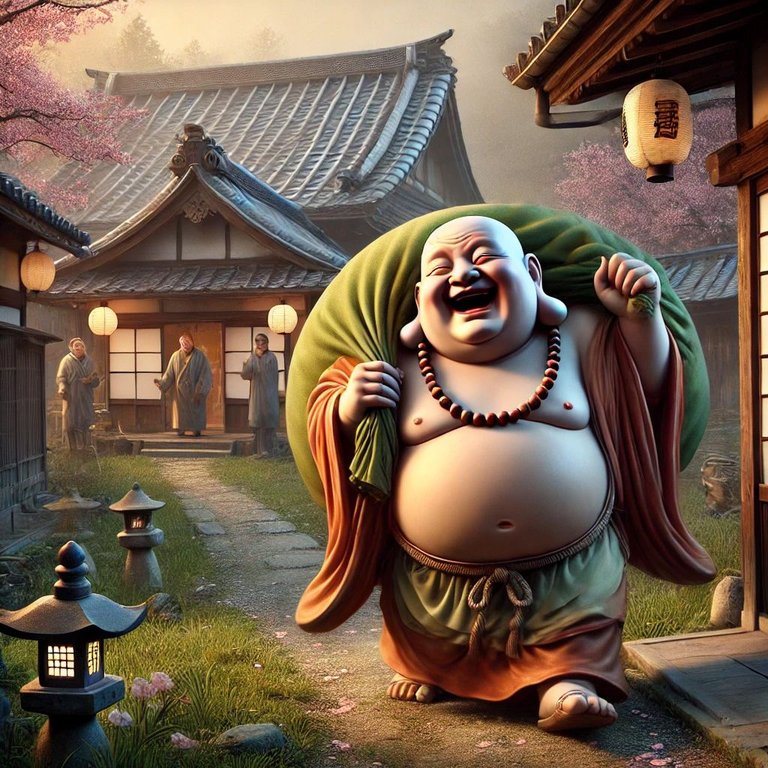Hotei and the Meaning of Life
One day Hotei came into town. Hotei, known as Budai in China, was a fat Zen monk who always had a smile on his face. In the West he is often referred to as "The Laughing Buddha" or sometimes "The Fat Buddha", and is often confused for the historic Buddha, Shakyamuni.

Hotei was well known at this time and in this place as a monk who had achieved enlightenment. Just as most laypeople today aren't quite sure what that term actually means, it was the same at that time. They assumed it was special, but not quite sure how or in what way.
So here comes Hotei, walking slowly into town, his back bent by a large heavy sack thrown over his shoulder, a smile on his face as always. Seeing him, a man decided to ask the question on everyone's mind. He approached the fat monk and asked him "Holy One, please tell me what is enlightenment like."
Without a word, Hotei put down his heavy sack. He stood up straight before the man, his smile growing larger.
The man took the meaning and thanked him. But then another question came to his mind. "Please one more question. What comes after enlightenment?"
Hotei's smile seemed to grow even more. Wordlessly he hunched over, picked up his sack, threw it over his shoulder and bent under the weight of it once again, them ambled off.

This Zen Tale, as people often call these kinds of stories, came to mind last night when I read @raymondspeak's great post about the meaning of life. I might have said it in a more philosophical way, but I am in agreement with what he writes. Go read it and see what you think.
There is a much abbreviated version of this story, by the way. Shortened all the way down to two sentences. It goes: Before Enlightenment chop wood, carry water. After enlightenment chop wood, carry water.
You may be tempted to think that the meaning of this story is that before and after are the same, but you'd be wrong. And if that confuses you, just go read Ray's piece and that explains things pretty well.
❦
 |
David LaSpina is an American photographer and translator lost in Japan, trying to capture the beauty of this country one photo at a time and searching for the perfect haiku. He blogs here and at laspina.org. Write him on Twitter or Mastodon. |
We appreciate you taking the time, to either use #ThoughtfulDailyPost, or otherwise help this Community grow. So...
Thank you!!
Its all about keeping on keeping on. I can get with that.
!LUV
@coinjoe, @wesphilbin(2/10) sent you LUV. | tools | discord | community | HiveWiki | <>< daily
There we go!
Love this kind of story. We learn more from silence and in silence. Life is how we see it🙏
Very good!
What a delightful post, Zen Tales are lovely to read and you do not disappoint with this one. Can I ask are you interested in wider Chinese culture and philosophy? I used to do research pieces on Confucian philosophy which I think is uniquely enlightening and empowering. As well as intelligence I think Confucius had an extraordinarily positive energy. His teachings were and are such a powerful force for good.
I was also interested in the cultural and artistic habits of the Chinese emperor Qianlong and the Qing dynasty, just such a beautiful and rich history. Do you know much about the Qing dynasty?
Glad you enjoyed the post!
My knowledge of China is pretty much limited to Zen history, as it moved through China as Chan Buddhism on its way to Japan, to some extent Buddhist history in general, and the Chinese poetry (usually Tang poetry) that early Japanese haiku poets loved. I have some vague ideas of the general history of the country, but nothing specific. I would say I'm more partial to Taoist ideas than Confucian ones, but given that Taoism had a much more profound influence on Zen and that is where my main philosophical interest lies, that's kind of a given. However, Confucian philosophy did have a huge effect on Japan, so I'm at least familiar with it in general terms.
I'm afraid all I know about the Qing is the general decline due in no some part to the West and then the sad ending of the last emperor. As to their more successful beginnings or highlights of the dynasty, I'm sadly in the dark.
I would like to learn more about Zen history and Buddhism, I think there is an enormous amount of fulfilling and positive lessons we can learn from it. I will be following your Zen knowledge very closely. Thanks again for your great post.
I like your Kamisama series posts so much!
Glad you enjoyed it!
To be honest I didn't understand the story may be I have a small brain 🧠
Naw. Zen stories defy logic because the idea is you can't understand the world by thinking.
The meaning is simply before enlightenment, we think it is something special. We are searching for something to make life easier. We are looking for an escape from the pain of life When we achieve enlightenment, we see the truth. Past enlightenment, we return to our life with understanding and do what we previously did, but this time with joy, embracing it instead of wanting to escape from it.
Thanks for explaining it in simple word now I have understand the meaning of the story.